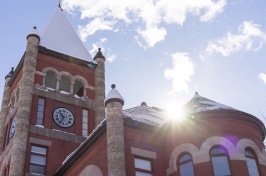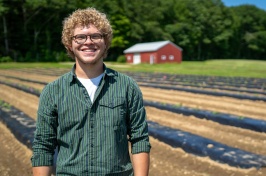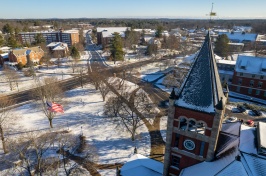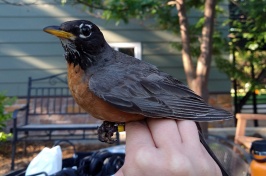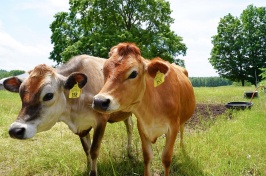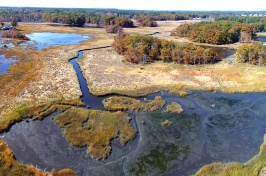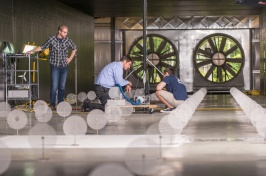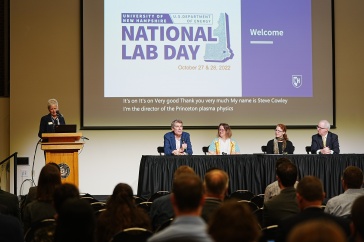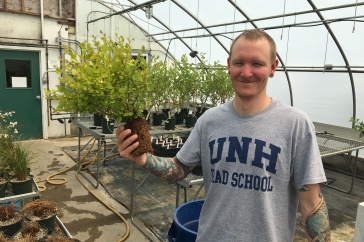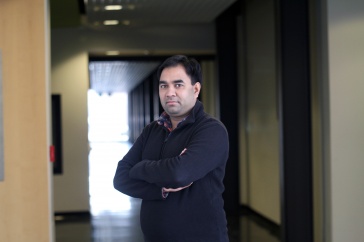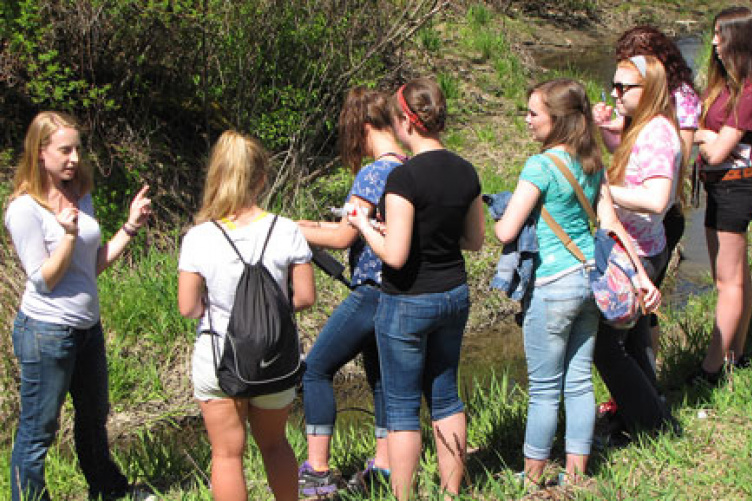
Students from the Biotechnology Program at Dover High School visited the UNH campus to learn about graduate level research. The visit was organized by the UNH Women in Science Group.
Lauren Koenig describes the high-tech equipment in the University of New Hampshire’s Water Quality Analysis Laboratory as "pieces of a puzzle." University scientists and students use the lab to analyze water samples from around the world, including specimens found on campus and those shipped all the way from Siberia.
“Each piece of the puzzle allows us to put together a whole picture of a stream,” says Koenig of the traditional machinery interspersed with robotic accessories used to help measure the nutrient composition of the water. “And these chemical parameters enable us to understand what’s happening on a biological scale,” she says.
On this day, Koenig, a first-year Ph.D. student of natural resources with a focus on stream and river biogeochemistry, explains her research methods to a group of honors students visiting from Dover High School. This field trip is part of the high school’s Biotechnology Program and affords the high-schoolers a first-hand view of high-level science research.
Recently, Koenig became one of four UNH students to receive the highly competitive National Science Foundation graduate research fellowship, which helps to fund her international research. In addition to her research, she feels passionately about sharing her interest with future environmental scientists such as today’s enthusiastic visitors.
“I never thought I’d study chemistry,” Koenig tells the students, “but I found that I could use it in an environmental application . . . and that really excites me.”
Liz Taylor, a science teacher in the Biotechnology Program at Dover High School, knows her students have expressed an interest in someday doing research in the life sciences or biotechnology. Taylor looks around at the equipment in the Water Quality Analysis Lab and says, “It’s cool that my students get to see all of these applications outside of the high school lab.”
Under the direction of Koenig and Bianca Rodriguez, a classmate of Koenig in the College of Life Sciences and Agriculture, the biotechnology students collected water samples and other data from College Brook. They used various instruments to examine dissolved oxygen, temperature, pH levels and conductivity.
Their research on this urban stream, which wends its way through campus as a tributary of the Oyster River, will become part of a long-term data set at UNH.
Rodriguez, originally from Puerto Rico, came to UNH specifically to work with COLSA’s Professor of Natural Resources and the Environment Bill McDowell. “Professor McDowell is well known in the field, and I knew I’d be able to do excellent research with him at UNH,” says Rodriguez who is currently studying nitrogen and carbon dynamics in the Lamprey River watershed.
In addition to visiting the Water Quality Analysis Laboratory at James Hall, the students also enjoyed presentations at the Fairchild Dairy Teaching and Research Center, the MacFarlane Greenhouse Facility and various labs throughout campus. Graduate students – including Megan Seneca, Liz Hodgdon, Lindsay Green, Hannah Traggis, Yvette Garner, Lesley Atwood, and Sara Edquist – dedicated their time and energy to give the high school students a glimpse into the many different streams of inquiry down which a STEM education can take you and how such studies impact the greater community.
Originally published by:
UNH Today
-
Written By:
Staff writer | Communications and Public Affairs











